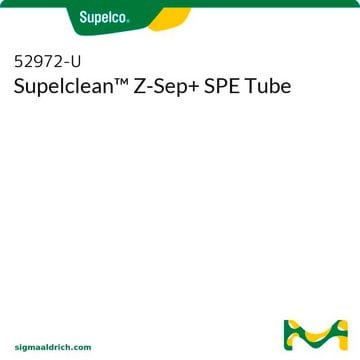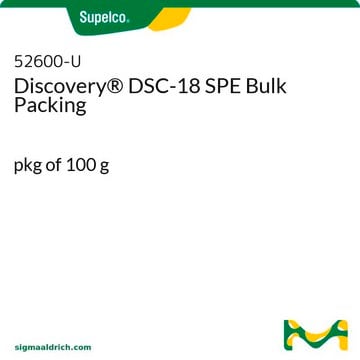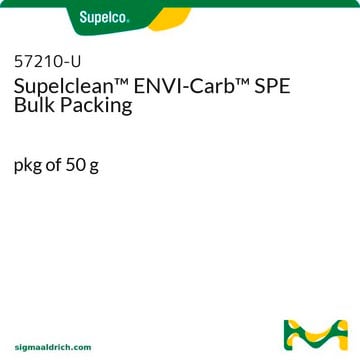55299-U
Supel™ QuE QuEChERS tube
Z-Sep+ Bulk, pkg of 20 g
Synonyma:
QuEChERS
Přihlásitk zobrazení cen stanovených pro organizaci a smluvních cen
About This Item
Doporučené produkty
product name
Supel™ QuE, Z-Sep+ Bulk, pkg of 20 g
material
polypropylene tube
product line
Supel™
composition
Z-Sep+ Bulk
packaging
pkg of 20 g
technique(s)
QuEChERS: suitable
surface area
480 m2/g
matrix
silica gel base material
matrix active group
zirconia-based phase
particle size
50 μm
pore size
70 Å pore size
application(s)
food and beverages
Hledáte podobné produkty? Navštivte Průvodce porovnáváním produktů
General description
Dispersive SPE (dSPE), often referred to as the "QuEChERS" method (Quick, Easy, Cheap, Effective, Rugged, and Safe), is modern sample prep technique that is becoming increasingly popular in the area of multi-residue pesticide analysis in food and agricultural products.
Using the QuEChERS method, food/agricultural samples are first extracted with an aqueous miscible solvent (e.g., acetonitrile) in the presence of high amounts of salts (e.g., sodium chloride and magnesium sulfate) and/or buffering agents (e.g. citrate) to induce liquid phase separation and stabilize acid and base labile pesticides, respectively. Upon shaking and centrifugation, an aliquot of the organic phase is subjected to further cleanup using SPE. Unlike traditional methods using SPE tubes, in dispersive SPE, cleanup is facilitated by mixing bulk amounts of SPE (e.g., Supelclean PSA, ENVI-Carb, and/or Discovery DSC-18) with the extract. After sample cleanup, the mixture is centrifuged and the resulting supernatant can either be analyzed directly or can be subjected to minor further treatment before analysis.
Supelco carries a line of vials and centrifuge tubes containing pre-determined amounts of salts and SPE sorbents to support the most common method configurations used today.
Using the QuEChERS method, food/agricultural samples are first extracted with an aqueous miscible solvent (e.g., acetonitrile) in the presence of high amounts of salts (e.g., sodium chloride and magnesium sulfate) and/or buffering agents (e.g. citrate) to induce liquid phase separation and stabilize acid and base labile pesticides, respectively. Upon shaking and centrifugation, an aliquot of the organic phase is subjected to further cleanup using SPE. Unlike traditional methods using SPE tubes, in dispersive SPE, cleanup is facilitated by mixing bulk amounts of SPE (e.g., Supelclean PSA, ENVI-Carb, and/or Discovery DSC-18) with the extract. After sample cleanup, the mixture is centrifuged and the resulting supernatant can either be analyzed directly or can be subjected to minor further treatment before analysis.
Supelco carries a line of vials and centrifuge tubes containing pre-determined amounts of salts and SPE sorbents to support the most common method configurations used today.
Other Notes
Supel™QuE Z-Sep+ enhances sample cleanup for complex matrices by effectively removing more fat and color from sample extracts than traditional phases for QuEChERS LC-MS methods. By eliminating problematic matrix interferences, Z-Sep products provide more robust LC-MS methods. This proprietary technology can replace C18 and PSA in your current methods without additional method development.
Z-Sep+ is recommended for cleanup of samples containing greater than 15% fat.
Z-Sep+ is recommended for cleanup of samples containing greater than 15% fat.
Legal Information
Certain uses of this product may be covered by the claims of one or more pending patent applications. For licensing inquiries please contact techserv@sial.com
Supel is a trademark of Sigma-Aldrich Co. LLC
Storage Class
11 - Combustible Solids
wgk_germany
nwg
flash_point_f
Not applicable
flash_point_c
Not applicable
Vyberte jednu z posledních verzí:
Již tento produkt vlastníte?
Dokumenty související s produkty, které jste v minulosti zakoupili, byly za účelem usnadnění shromážděny ve vaší Knihovně dokumentů.
Zákazníci si také prohlíželi
Keiko Iwakoshi et al.
Shokuhin eiseigaku zasshi. Journal of the Food Hygienic Society of Japan, 57(5), 150-154 (2016-10-28)
Rapid multi-residue analysis of pesticides in pulses was developed using LC-MS/MS. Pesticide residues in 5 g of homogenized pulses were extracted with 30 mL of acetonitrile and salted out with 4 g of anhydrous magnesium sulfate and 2 g of
Pol Herrero et al.
Journal of chromatography. A, 1339, 34-41 (2014-03-25)
A Quick, Easy, Cheap, Effective, Rugged and Safe (QuEChERS) extraction method followed by liquid chromatography-(Orbitrap) high resolution mass spectrometry was developed for the simultaneous determination of five benzotriazole, four benzothiazole and five benzenesulfonamide derivates in sewage sludge. While the method
Lianzhu Wang et al.
Se pu = Chinese journal of chromatography, 33(5), 501-507 (2015-09-22)
A fast method based on QuEChERS methodology for the simultaneous determination of 32 sulfonylurea herbicide residues in sweet corns and green soybeans was developed using liquid chromatography-tandem mass spectrometry (LC-MS/MS). The clean-up effects of three dispersive sorbents were evaluated in
Łukasz Rajski et al.
Journal of chromatography. A, 1304, 109-120 (2013-07-23)
Several extraction methods were evaluated in terms of recoveries and extraction precision for 113 pesticides in avocado: QuEChERS with various d-SPE clean-ups (Z-Sep, Z-Sep+, PSA+C18 and silica), miniLuke and ethyl acetate. Extracts were analysed using liquid chromatography coupled with triple
Darina Lankova et al.
Analytical and bioanalytical chemistry, 408(10), 2515-2525 (2016-02-11)
In this study, a novel analytical approach for the determination of 11 monohydroxylated polycyclic aromatic hydrocarbon metabolites (OH-PAHs) in urine was developed and validated. The rapid, simple and high-throughput sample preparation procedure based on ethyl acetate extraction and subsequent purification
Chromatograms
suitable for GC, application for SPEsuitable for GC, application for SPENáš tým vědeckých pracovníků má zkušenosti ve všech oblastech výzkumu, včetně přírodních věd, materiálových věd, chemické syntézy, chromatografie, analytiky a mnoha dalších..
Obraťte se na technický servis.






